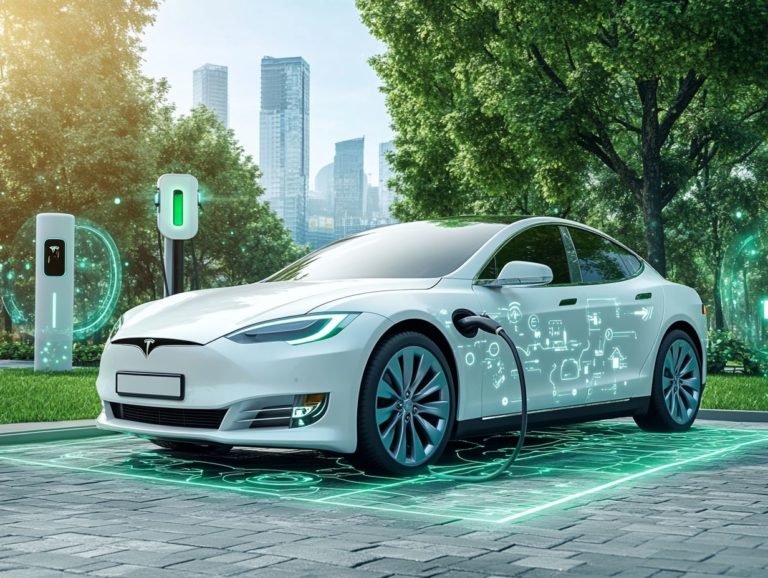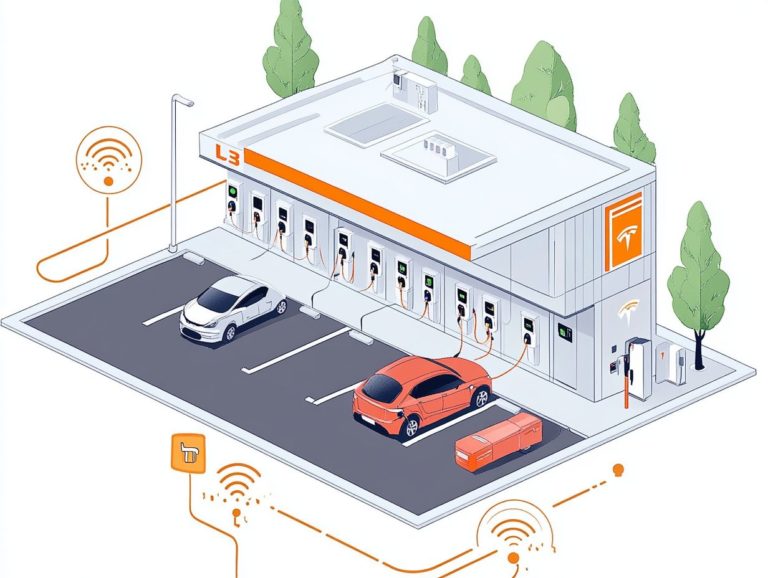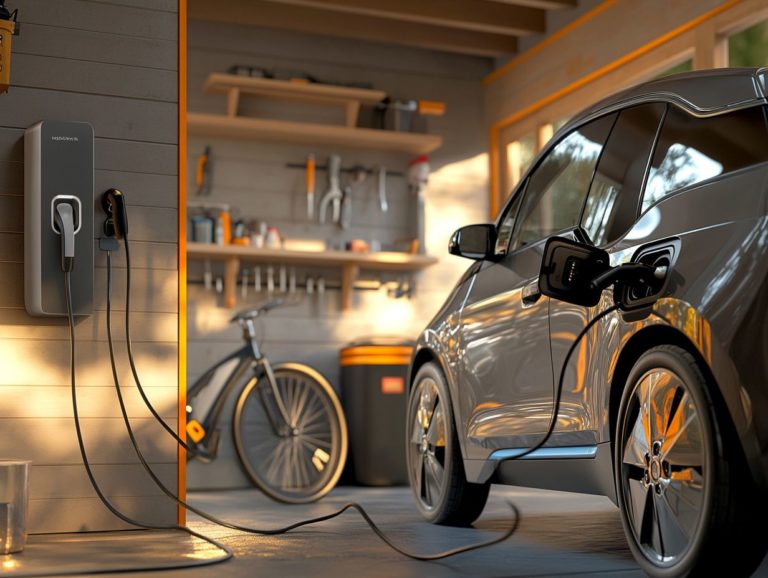What Should I Look for When Buying an EV?
Electric vehicles (EVs) are revolutionizing your perspective on transportation, seamlessly combining cutting-edge technology with eco-friendliness.
You might be wondering: what exactly are they, and how do they function? This article delves into the myriad benefits of owning an EV, from economic savings to their positive environmental impact.
You’ll also explore key considerations when selecting an EV, such as range, charging options, and maintenance requirements. A comparison of different models will guide you in making the best choice tailored to your lifestyle.
Excited to see how an electric vehicle can transform your daily commute? Let s jump in!
Contents
Key Takeaways:

- Consider the range and charging options of the EV to ensure it meets your daily driving needs.
- Think about the ongoing costs and incentives available for EVs, as well as the maintenance and battery life when making a purchase decision.
- Compare different models and features to find the EV that best fits your lifestyle and driving needs.
Ready to experience the future of transportation? Start exploring your EV options today!
What are EVs and How Do They Work?
Electric vehicles (EVs) represent a groundbreaking shift in automotive technology, harnessing electric power to drive instead of relying on traditional gasoline engines. In recent years, you’ve likely noticed the rising popularity of models like the Tesla Model 3 and Hyundai Ioniq 5, both of which boast innovative features such as regenerative braking and instant torque. These advancements significantly enhance your driving experience.
For potential buyers, grasping how these vehicles operate is essential. Understanding the challenges of range anxiety and the need for accessible charging stations whether at home or in public spaces is critical.
At the core of this innovation is advanced battery technology, typically lithium-ion. This not only improves energy storage but also extends driving range. Your charging options are diverse, including Level 1 home chargers, Level 2 public stations, and rapid DC fast chargers, providing you with flexibility in how and when to recharge.
Charging speed is crucial; it helps integrate EVs into your daily routine. Regenerative braking is another standout feature that helps capture energy when the vehicle slows down, which can be used to recharge the battery. Meanwhile, manufacturers like Ford and Nissan are continually evolving their models to address range concerns, making electric vehicles increasingly viable as your primary mode of transportation.
Benefits of Owning an EV
Owning an electric vehicle (EV) presents you with a wealth of benefits that transcend mere fuel savings. These remarkable machines play a pivotal role in reducing environmental impact, delivering economic advantages, and offering unmatched convenience.
With cutting-edge technologies such as Tesla’s autopilot and the swift proliferation of public charging stations, the EV experience is rapidly evolving, making it a smart choice for those who prioritize sustainability and seek a smarter, more efficient way to travel.
Economic, Environmental, and Convenience Factors
The economic, environmental, and convenience aspects of electric vehicles (EVs) are closely connected. They highlight the myriad benefits of making the switch from gasoline-powered cars.
Economically, you ll enjoy lower fuel costs and potential tax incentives. Environmentally, EVs offer the advantage of zero tailpipe emissions, which contributes to cleaner air and a healthier planet.
The growing network of over 100,000 charging stations whether at home or in public enhances your driving experience. This makes EVs an increasingly appealing choice.
Recent studies reveal that you could save up to $800 annually on fuel by choosing an EV over a traditional vehicle. This is thanks to the significantly lower cost of electricity.
Maintenance savings are also noteworthy. EVs boast fewer moving parts and eliminate the need for oil changes, leading to an average reduction of 40% in maintenance costs.
From an environmental perspective, a report by the Union of Concerned Scientists highlights that EVs produce roughly 50% fewer emissions over their lifespan compared to equivalent gasoline vehicles. This emphasizes their crucial role in combating climate change.
With the growing network of charging stations, range anxiety becomes a thing of the past. You can easily charge your vehicle during daily routines or longer trips, reinforcing the allure of opting for electric over conventional options.
Important Considerations When Buying an EV
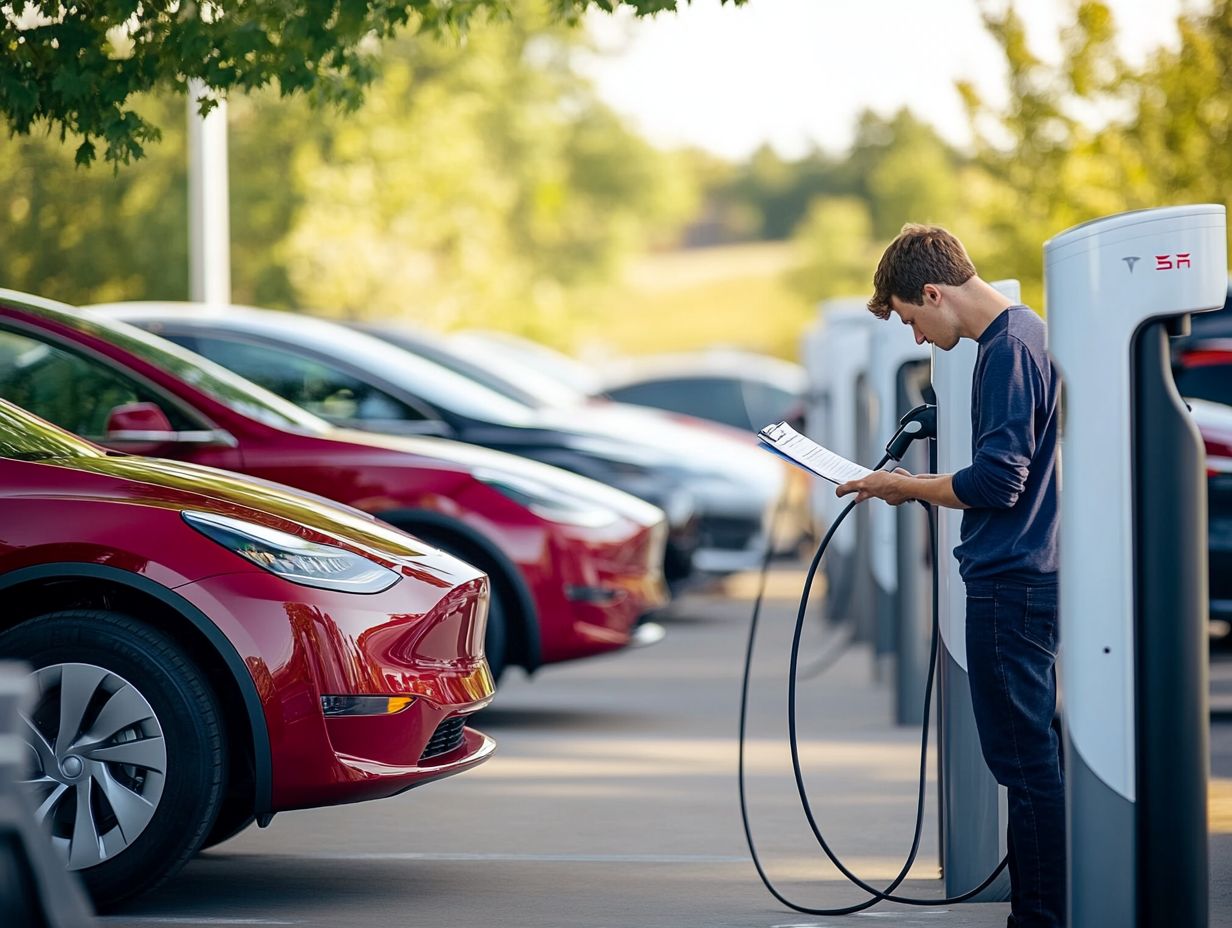
When you’re contemplating the purchase of an electric vehicle (EV), consider these key factors, including leasing vs buying an EV, to make your experience exciting and satisfying!
Familiarize yourself with the various charging options available. These range from home charging setups to public charging stations, and they play a significant role in your daily convenience.
Evaluate the potential for range anxiety to ensure you feel confident on the road. Aspects such as battery life, ongoing maintenance, and available cost incentives can significantly impact your overall experience.
Prioritizing these considerations will ensure that your transition to electric driving is as seamless and enjoyable as possible!
Range and Charging Options
When considering the practicality of owning an electric vehicle (EV), range and charging options are paramount. They shape your driving experience and ease of use.
Many prospective buyers grapple with the fear of running out of battery power when you’re far from home. Understanding the different charging options is essential, including home charging setups and public charging stations.
Recognizing the difference between Level 1 and Level 2 home chargers is crucial. Level 1 chargers can turn standard outlets into charging options, but they tend to be slower than the more powerful Level 2 chargers, which dramatically reduce your charging times.
On the public side, fast charging stations equipped with DC fast chargers enable you to replenish substantial portions of your battery capacity in under an hour. This eases many concerns that come with longer trips.
Different EV models cater to these needs uniquely. For example, the Nissan Leaf provides a practical range for your daily commute. In contrast, the Lucid Air offers an extended range and ultra-fast charging capabilities for those who demand more from their vehicle.
So why wait? Start your electric journey today and explore the exciting world of electric vehicles!
Battery Life and Maintenance
Battery life and maintenance are essential considerations for you as an electric vehicle (EV) owner, affecting how long your vehicle lasts and your overall ownership costs. By understanding the expected lifespan of your EV’s battery and the necessary maintenance routines, you can alleviate concerns about performance and reliability. This ensures a satisfying driving experience with the advanced features that many modern models provide.
It’s great to know that battery packs generally last between eight to fifteen years, depending on the model and your driving conditions. Factors like frequent rapid charging, extreme temperatures, and fast driving can negatively affect battery health. This makes your driving habits a crucial aspect to consider.
By implementing routine maintenance practices such as avoiding prolonged high state-of-charge levels and utilizing regenerative braking you can significantly enhance the longevity of your battery. Vehicles like the Tesla Model 3 and Hyundai Ioniq 5 come equipped with advanced features designed to optimize battery usage, potentially reducing long-term maintenance costs while boosting performance.
Cost and Incentives
The cost of purchasing an electric vehicle (EV) can vary significantly based on the model you choose and the government incentives available to you, making thorough research essential. In many countries, including the US and UK, various incentives can substantially lower the initial purchase price of popular models like the Tesla Model 3, Kia EV6, or BMW i5. This enhances their financial appeal for you.
It’s crucial to factor in ongoing expenses such as insurance, maintenance, and charging costs, as these can differ quite a bit from traditional vehicles. Maintenance fees are often lower due to the reduced number of moving parts in electric cars. You can also save significantly on fuel costs, especially if you have the option to charge at home.
Don’t overlook the various local and federal incentives, including tax credits and rebates. These can boost affordability and encourage you to embrace sustainable driving choices.
Types of EVs Available

The market for electric vehicles (EVs) is experiencing rapid growth, presenting a diverse array of models tailored to meet your specific needs, preferences, and budget.
Whether you re drawn to high-performance options like the Lucid Air, practical choices such as the Nissan Leaf, or stylish offerings like the BMW i5 and Mercedes B-Class, there s an EV designed to complement your lifestyle.
By familiarizing yourself with the various types available, you can make informed decisions that align perfectly with your unique requirements.
Comparing Different Models and Features
Comparing different electric vehicle (EV) models and their features is essential for you as a prospective buyer to find the perfect match for your needs and preferences. Key aspects to evaluate include important features like range, charging speed, and driving experience, alongside innovative technologies such as the self-driving features of the Tesla Model 3 or the striking design of the Hyundai Ioniq 5 and Kia EV6.
By looking into these elements, you can discern which vehicle aligns best with your lifestyle. Whether you prioritize long-distance travel, urban commuting, or cutting-edge technology, there s something for everyone. For instance, the Tesla Model 3 stands out with its impressive range and advanced driver-assistance systems, making it an excellent choice for those who are tech-savvy.
The BMW i5 offers a luxurious experience paired with dynamic driving performance, appealing to those who seek elegance on the road.
Then there s the Ford Mustang Mach-E, which beautifully blends sporty aesthetics with practicality, catering to a more adventurous crowd. Understanding these distinctions gives you the power to make informed choices tailored to your unique demands.
Tips for Choosing the Right Electric Vehicle (EV) for You
Choosing the right electric vehicle (EV) requires thoughtful consideration of your unique needs and lifestyle. It’s thrilling to find the perfect fit for your driving needs while alleviating worries about how far the car can go.
Factors like your daily commute distance, available charging options, and the type of driving you typically do should significantly influence your decision-making process. This careful evaluation will guide you in selecting a model that perfectly aligns with your requirements.
Factors to Consider Based on Your Needs and Lifestyle
When selecting an EV, consider factors that align with your lifestyle to ensure the best driving experience. Key aspects include your daily commute distance, access to home charging facilities, and preferences for public charging stations on longer trips.
If your daily commute is less than 30 miles, a compact model with a modest range might be just right for you. However, for frequent longer journeys, an EV with extended range capabilities will keep you moving seamlessly.
The availability of charging infrastructure also shapes your vehicle choice. Urban residents may favor models that work with rapid charging stations, while those in rural areas might prioritize vehicles with impressive battery longevity.
Your lifestyle plays a vital role families in need of ample cargo space might be drawn to SUVs, while eco-conscious individuals may prefer brands that emphasize sustainability in their production processes.
By aligning these factors with your personal preferences and daily habits, you can make a truly informed choice that suits your lifestyle perfectly.
Frequently Asked Questions
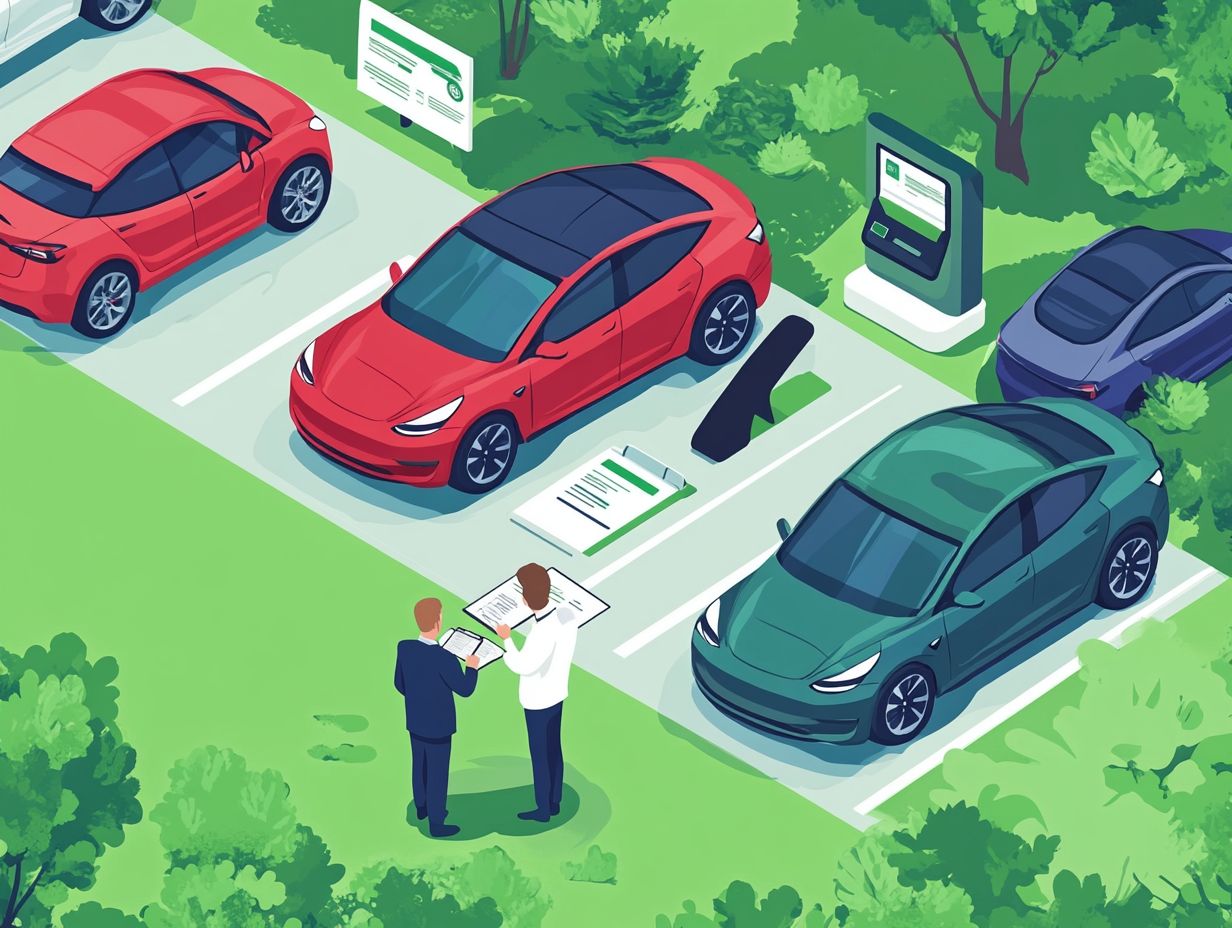
-
What Should I Look for When Buying an EV?
-
When buying an EV, consider key factors to ensure you make the best purchase for your needs.
-
What is the driving range of the EV?
-
The driving range refers to how far the EV can travel on a single charge. This is crucial if you plan to use it for long-distance trips.
-
Does the EV come with a warranty?
-
Check if the EV includes a warranty, as this will cover any potential issues or defects.
-
What charging options are available for the EV?
-
Different EV models may have various charging options. Research the specific charging options for the EV you are interested in.
-
What incentives or tax credits are available for buying an EV?
-
Some governments offer incentives or tax credits for purchasing an EV, which can help offset the cost. Explore these options before making a purchase.
-
Is the EV compatible with my lifestyle?
-
Consider your daily driving needs and habits. Ensure the EV you choose meets your requirements, especially for long commutes or frequent long-distance travel.
Explore your options and take the next steps in your EV journey!



